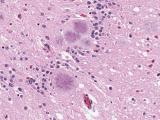Nov 18, 2005 (CIDRAP News) The US Department of Agriculture (USDA) plans to keep its expanded testing program for bovine spongiform encephalopathy (BSE) going indefinitely instead of scaling it back at the end of this year, according to recent reports.
Agriculture Secretary Mike Johanns said he wants the department to continue testing about 1,000 cattle a day, according to a Nov 12 Associated Press (AP) report.
Johanns told the AP he was very reluctant to set a date for putting the brakes on the testing program. "It's safe to say the enhanced surveillance is going to extend beyond the end of December," he said.
The department has tested more than 522,000 cattle since the testing program was expanded in June 2004, 6 months after the first US case of BSE was found in a Canadian-born cow in Washington state in December 2003. The original plan called for running the program for 12 to 18 months. Previously the government had tested about 40,000 cattle a year.
US officials hope that Japan will soon reopen its market to American beef, which has been barred from Japan ever since the first US BSE case turned up. Previously, Japan was the biggest buyer of US beef.
Johanns said the decision to maintain the testing is not a response to Japanese concerns, according to the AP report. He said he wants to make sure testing covers all regions of the country and that healthy animals are tested.
The testing has focused primarily on cattle at increased risk for BSE, including sick, injured, and dead animals. But the original plan called for testing 20,000 apparently healthy animals as well.
Johanns said the testing of healthy cattle is under way. "We've been working our way through 20,000 healthy animals," he told the AP.
Critics of the USDA have said higher testing levels are needed to reassure Japan and other trading partners, the AP reported. Sen. Tom Harkin, D-Iowa, and other lawmakers have been pushing the department to test at least 20,000 healthy cattle before downshifting the program, the story said.

















